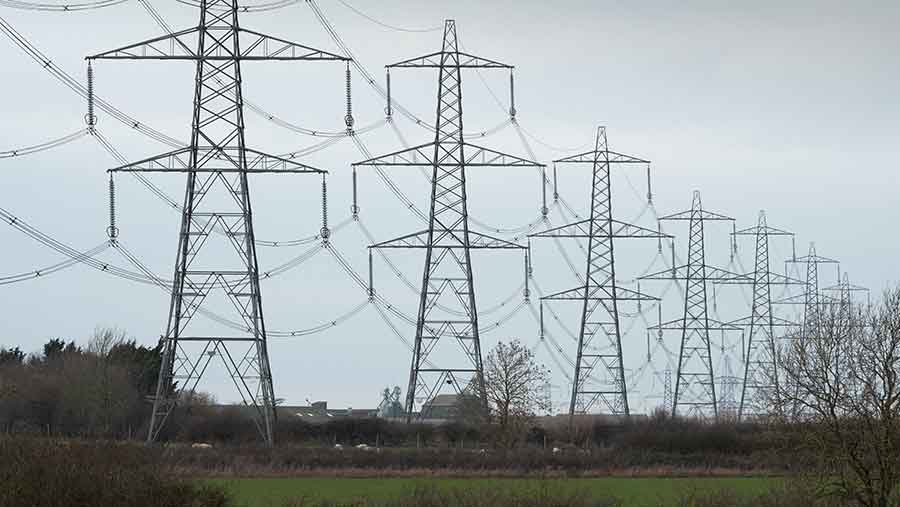Lincs farmland under threat from massive pylons project
 © Tim Scrivener
© Tim Scrivener National Grid’s plans to construct 87 miles of power cables through Lincolnshire will see more than 6,800ha of land being gobbled up, including some of the best prime agricultural land in the country, warn campaigners.
Much of this is Grade 1 arable land – the finest food-growing land in the country, according to campaign group No Pylons Lincolnshire.
Prime minister Rishi Sunak was asked about the effect of National Grid’s plans on food production when he visited the county last week.
See also: How farmers face huge disruption from electricity infrastructure
He told the BBC’s Look North programme: “We need to increase food production. Food security is really important and we need to protect our prime agricultural land for that purpose.”
Campaigners from No Pylons Lincolnshire welcomed Mr Sunak’s comments on food security, but pointed out they appear to “fly in the face” of National Grid’s plans.
Initially, National Grid announced that it needed to build a new overground cable line linking Grimsby and Walpole, a Fenland village located just over the county border in west Norfolk.
However, when campaigners at No Pylons Lincolnshire looked into the plans, they discovered that there were 14 onland energy-generating products that seek to take advantage of connecting to the grid via the overhead links.
National Grid says it has already “contracted to connect” several new onshore sources of energy in Lincolnshire by the mid 2030s.
The energy company says the development of sources of “clean, green energy” is necessary to meet the government’s net-zero aims.
No Pylons Lincolnshire has calculated that, based on National Grid’s proposals and connections list, about 26sq miles of land could be needed – about twice the size of Lincoln and its borough.
Cat Makinson, the founder of No Pylons Lincolnshire, said: “This is not just about power from offshore wind farms, it’s much bigger than that.
“It’s about all the land-based infrastructure – solar farms, battery storage, power stations and hydrogen plants – that the new overland line will attract.”
Farmer upset
Local farmers are outraged by the proposals. Hazel Needham, a third-generation farmer based at Fosdyke, warned: “Food will be replaced by a harvest of electricity.
“We will have to import more food that we can grow here in Lincolnshire, and that will cost everyone more.”
Robert Oldershaw is a director of Oldershaws of Moulton, which supplies about 20-25% of the UK’s retail onions. National Grid has sent the company maps showing the cable line crossing some of its fields.
“British food security is paramount and taking prime agricultural land out of production for energy production seems completely counterintuitive when there are alternatives out there and you consider all the unrest in the world at the moment,” said Mr Oldershaw.
Conservative county councillor Colin Davie added: “National Grid will destroy forever the beauty of the Lincolnshire countryside and use our best growing land by turning it into an energy production hub.
“It would come at the expense of national food security, unnecessarily destroying the Lincolnshire countryside.”
No Pylons Lincolnshire also has concerns that National Grid’s onland infrastructure plans will result in the overproduction of energy, up to seven times more capacity than the current peak for the whole of Great Britain and over four times more than the potential peak in 2050.
The group is campaigning for offshore energy to be part of an integrated grid in the same way as they are doing in Denmark, reducing the need for onshore infrastructure.
Victoria Atkins, Conservative MP for Horncastle and Louth, is calling for an independent review of the offshore alternatives.
National Grid response
National Grid says the UK government has set an ambition to connect up to 50GW of offshore wind by 2030 – enough to power every home in the country.
As such, it has been carrying out assessments to find the most appropriate way to achieve this in Lincolnshire and elsewhere.
A spokesperson said: “We understand that plans for new infrastructure, including overhead lines and pylons, can cause concern in nearby communities and we will be giving careful consideration to all the feedback we receive through our first consultation process, which ends on 13 March.”
National Grid’s public consultation on its early-stage proposals for the Grimsby to Walpole line ends on 13 March.
